In the French sales process—especially for rural and agricultural land—SAFER (Sociétés d’Aménagement Foncier et d’Établissement Rural) play a very specific and important role.
What is SAFER?
SAFERs are semi-public organizations created in the 1960s to manage and regulate the sale of rural property in France. Their mission is to:
- Preserve agricultural land
- Support young farmers and agricultural development
- Maintain the structure of rural areas
- Prevent speculation and urban sprawl
Their Role in the Sales Process
Whenever agricultural or rural land (and sometimes even forests or vineyards) is sold in France, SAFER has a right of preemption—which means:
1. Mandatory Notification
All sales of rural/agricultural land must be notified to the relevant SAFER office. This is usually handled by the notaire (notary) managing the sale.
2. Right of First Refusal (Preemption)
SAFER then has two months to decide whether it wants to:
- Buy the property itself at the agreed sale price (to resell it to a farmer or for public interest), or
- Let the sale go ahead to the intended buyer.
If SAFER decides to preempt, they often resell the land to young farmers, agricultural cooperatives, or others aligned with rural development goals.
3. Price Regulation
If SAFER believes the price is inflated or not in line with market values, it can:
- Refuse the sale at that price and offer to buy the property at what it considers the fair market value.
This process can delay or complicate sales slightly, especially when there’s a mismatch between buyer, seller, and SAFER’s vision.
When Does SAFER Not Apply?
SAFER’s preemption right doesn’t always apply. For example:
- If the sale involves only buildings or urban land
- If the land is under a certain size
- If certain family transfers are taking place (e.g. between close relatives)




